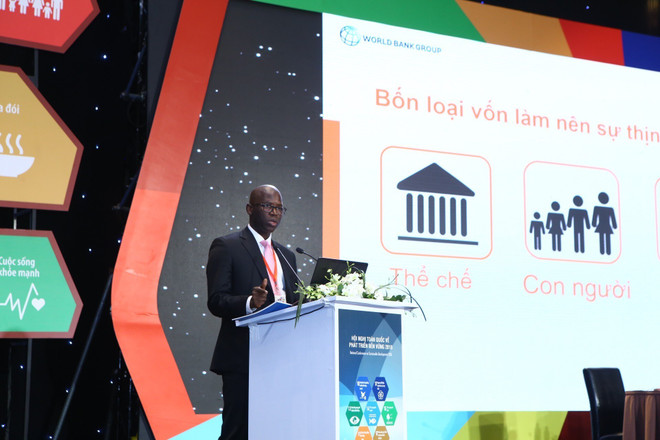 World Bank Country Director for Vietnam Ousmane Dione speaks at the National Conference on Sustainable Development in Hanoi on July 5 (Photo: VNA)
World Bank Country Director for Vietnam Ousmane Dione speaks at the National Conference on Sustainable Development in Hanoi on July 5 (Photo: VNA)Hanoi (VNS/VNA) – Vietnam’s economy can be re-defined by focusing onthe effective exploitation of four megatrends affecting the country’ssustainable and competitive development.
The statement was made by Ousmane Dione, country director of World Bank inVietnam, during a conference held on in Hanoi, themed ‘EnhancingCompetitiveness, Realising Sustainable Development Goals’.
The event was co-organised by the Vietnam Chamber of Commerce and Industry(VCCI), Vietnam Business Council for Sustainable Development (VBCSD) and theWorld Bank.
“Megatrends are regional or global in nature, and they are sustained andtransformational forces that can re-define our world by changing the rules ofthe game,” Dione said.
Four specific megatrends Dione mentioned comprised of shifting trade patterns,rising knowledge economy, climate change, and an aging population.
“Megatrends present risks and opportunities, and the trick is to figure out howto leverage them to work in Vietnam’s advantage.”
Ousmane Dione also introduced key findings from the World Bank’s report ‘Vietnam’s future jobs’, which emphasised the effective exploitation of thementioned megatrends and how these trends would affect Vietnam’s jobsstructure and economic reform process.
“Jobs have been a fundamental part of Vietnam’s rapid transformation to amodern, globally integrated, middle-income country,” Dione said, addingthat the country’s 50 million jobs, along with its shift towards services andmanufacturing have contributed to plunging poverty rates and boosting strongeconomic growth over the last few decades.
“The world is on the cusp of new opportunities that could further shift Vietnam’sjobs picture. The rise of the Asian consumer class, especially in China, ashift toward knowledge economies, new trade partners and patterns, automationin the workplace, and aging, all threaten Vietnam’s current jobs structure, butthey also offer opportunities.”
However, Vietnam’s job structure is not yet conductive to adapting to thesemegatrends, Dione said.
“The 21st century workers require a more complex set of skills than in thepast. This is being driven by automation, where machines are taking over manualand routine jobs, as well as an increase in demand for products and servicesdriven by the expanding consumer class.”
Meanwhile, a critical challenge in Vietnam is that only 8 percent of the labourforce has a university education, which is insufficient to make the leap intothe knowledge economy. Ethnic minorities, older workers, and pockets of youthin Vietnam are particularly vulnerable, he added.
Most of the country’s jobs are in family farming, household enterprises orlow-skilled labour. Few jobs are currently positioned to embrace themegatrends. For example, only 2.1 million jobs are offered by foreign factoriesthat pay above the minimum wage, while registered domestic firms provide nomore than six million jobs.
To help Vietnam’s resilience to megatrends and effective implementation ofsustainable development goals as well as improving competitiveness, the fourtypes of capital – institutional, human, physical and natural – must bedeveloped and deployed efficiently, equitably and effectively, he said.
He added that the WB’s report also identified three reform areas that would beessential to capture the job-related opportunities offered by a changingeconomic and social context. The first is to create more jobs in specificsegments of the modern sector, namely via Vietnam’s SMEs, agro-industry, andvalue chains. The second is to enhance the quality of jobs in the traditionalsectors, which is a significant part of the jobs landscape. The third is toconnect qualified workers to the right jobs.
Matt Wilson, Director of Corporate Affairs of Heineken Vietnam, which wasrecognised as the most sustainable company in Vietnam by VCCI in 2017, saidHeineken Vietnam is committed to building a healthy and safe workplace foundedon mutual respect, diversity and the development of people.
“We are dedicated to helping our employees develop to their fullest potentialthrough investments in training and development programmes that help them gainthe necessary skills and knowledge to progress in their career path.”
In 2017, Heineken, directly employed approximately 2,800 employees andsupported over 156,000 indirect jobs, equivalent to 0.3 percent of Vietnam’s totallabour force, across its value chain.
At the event, VCCI Chairman and Co-chair of the Vietnam Business Council forSustainable Development (VBCSD) Vu Tien Loc said that Vietnam would acceleratethe economic reform process and become a high-middle-income country within thenext two decades, with impressive achievements in social justice and equalityand effective State management.
He emphasised the consensus and concerted efforts of all social classes, theeffective support and cooperation of related parties and internationalorganisations.
The conference also focused on issues and solutions to promote public-privatepartnerships, recommendations from the business community and internationalorganisations to promote the implementation of the Government’s actionprogrammes to improve productivity and competitiveness, towards sustainabledevelopment in the digital era.
The event was attended by more than 650 delegates, representing governmentalagencies, ministries, localities, research institutions, internationalorganisations and business associations.
Within the framework of the conference, the Ministry of Planning and Investmentand the VCCI also announced the Partnering for Green Growth and the GlobalGoals 2030 (P4G), a new global partnership initiative aiming to facilitateand leverage strategic global public-private partnerships to contribute to theimplementation of the 2030 Global Sustainable Development Goal through theimplementation of Green Growth.-VNS/VNA





























